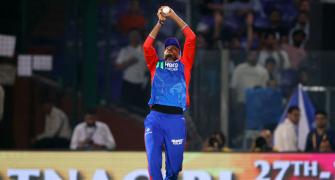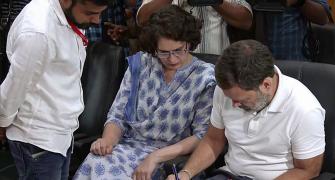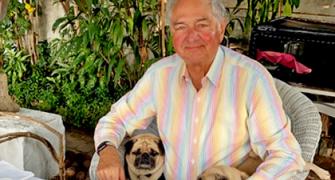Since he was diagnosed with diabetes eight years ago, Ravi Jain has been careful about what he eats. He has cut down on sugar, salt, rice and fried foods.
In his tea, he substitutes Sweet'N Low for sugar, and walks at least two miles, thrice a week. To manage his diabetes, he takes the drugs Metformin and Avandia.
During Indian festivals, when platefuls of sweets are routinely passed around, Jain exercises self-restraint. "I take a one-fourth slice of Burfi instead of the whole piece," he says. That too is an occasional privilege. "It is not easy, but one has to make changes [in lifestyle]," he adds. "What else can you do?"
According to the American Diabetes Association, 20.8 million people in the United States have diabetes. Compared to other populations, people of Indian origin are at a heightened risk for Type 2 diabetes. In 2007, India had the largest number of people -- 40.9 million -- living with diabetes, according to the International Diabetes Federation.

China came a close second with 39.8 million.
Diabetes is a disease in which the body either does not produce enough insulin or does not properly use it. The hormone insulin moves sugar, in the form of glucose, from the blood to the cells to provide energy. If there is not enough insulin, the level of sugar in the blood may get too high.
On the one hand, the cells are starved, and on the other this extra sugar in the blood causes harm.
Symptoms of high blood sugar include increased thirst, increased urination, weight loss and blurred vision. Uncontrolled high blood sugar, when present for a long time, can cause health problems like heart disease, kidney disease, blindness and poor circulation, says Kamala Mantha-Thaler, research coordinator at Beth Israel Medical Center's Gerald J Friedman Diabetes Institute.
Her institute has received a $255,000 grant from the New York State Health Foundation to help improve diabetes care and awareness in the South Asian population in Queens Borough (of New York), home to 34 per cent of the 307,000 South Asians in New York State.
According to the NYS Health Foundation, a private organisation dedicating to improving health of New Yorkers, South Asians have the highest rate of Type 2 diabetes (where insulin is produced but the body cannot use it) among ethnic groups in New York City.
Blame it all on your genes. In a study published in the March 2008 issue of the journal Diabetes, researchers at Mayo Clinic in Rochester, Minnesota, found that their Indian subjects -- diabetic or not -- had a greater degree of insulin resistance than Americans of Northern European origin.
Insulin resistance is a condition where the normal amount of insulin secreted by the body is not able to perform its function.
The team, led by Dr K Sreekumaran Nair, professor of medicine and consultant in endocrinology at Mayo Clinic, was trying to see if Indians had any metabolic differences compared to Northern European Americans that may render them more susceptible to diabetes.
They studied 13 diabetic Indians, 13 non-diabetic Indians, and 13 non-diabetic Northern European Americans who were matched for age, body mass index and sex.
Another surprising finding related to Mitochondria -- sub units present inside cells that convert nutrients into a form of energy called ATP. Earlier studies had found that diabetics had a diminished capacity to produce ATP.
Mayo researchers found that Indians -- diabetic or not -- actually had higher mitochondrial function, which means a higher capacity to produce ATP than subjects of Northern European descent.
Researchers believe, for several reasons, that energy metabolism and mitochondrion function has something to do with to insulin resistance and Type 2 diabetes.
In Europe, where emigration occurred approximately 40,000 years ago, vegetation was sparse and the diet was probably energy-dense meat products. This may have led the residents to undergo adaptations. Indians, on the other hand, lived in an agrarian society, probably eating a low-calorie vegetarian diet, the research suggests.
Having mitochondria with a capacity to produce more ATP was probably an advantage in that situation, Nair says, adding that now, when food is plentiful and people spend less energy, it could be a disadvantage.
That there is low prevalence of diabetes in rural India compared to metros like Mumbai and Kolkata suggests the ties to lifestyle, he says.
Indians also get diabetes at a much earlier age, in their late 30s or early 40s (and at relatively lower weights), which increases their chance of developing complications such as cardiovascular disease, Nair says.
Further studies are being conducted to better understand these differences in Asian Indians, Nair says. Those wanting to participate can contact Dr Sumit Bhagra at Bhagra.sumit@mayo.edu
The South Asian Health Initiative at New York University conducted focus groups between January and April 2007 to study the community's experience with diet and exercise and interaction with the medical system.
The Initiative, led by Dr Jyotsna Changrani, conducts about 20 health fairs a year. It is a permanent feature at the annual Diwali celebration in Jackson Heights, Queens.
The team, which includes physicians, interns as well as volunteers from organizations such as the Indian Students Association at NYU College of Dentistry, screen visitors for blood pressure, height, weight, cholesterol and (casual plasma) glucose level, and makes referrals to partners such as Elmhurst Hospital Center's South Asian Outreach Program and Bellevue Hospital Center.
The five focus groups with a total of 57 participants were spread across Jackson Heights, Elmhurst, Woodside and Flushing. Subjects were first-generation immigrants between ages 35 and 69. Many participants said while their diet had not changed since coming to America, their lives had become more sedentary.
They also mentioned the habit to eat a lot, and then going to sleep immediately after. Some said they worked long hours and it was difficult to find the time to exercise regularly.
Many participants said it was difficult to follow the doctors' advice on diet and exercise beyond a day or two "because then it becomes hard to say no to the food they enjoy, or to continue exercising."
Arvind Gandhi, a recent migrant to the US who has diabetes, says he walks between three and four miles a day, a habit he has maintained since he lived in India. Gandhi, who is retired, also does pranayam (breathing exercises). "Diseases are stress-related, so I try to keep myself tension-free," he says.
For people like Gandhi, the Gerald J Friedman Diabetes Institute is launching the Queens South Asian Action for Diabetes Education Programs and Treatment.
Under ADEPT, a certified diabetes educator will provide free diabetes education and guidance in self-management; a nutritionist will provide counselling, and patients will get the opportunity to utilise the Diabetes Institute in Manhattan for exercise classes and consultation with an exercise physiologist; diabetes education material will be translated into South Asian languages; and a list of participating providers be made available to patients.
Kamala Mantha-Thaler says ADEPT will reach out to all age-groups in Queens, addressing issues like the risk of uncontrolled diabetes and benefits of control, how to maintain optimal blood glucose levels, as well as nutrition and exercise.
"Additional topics include self-monitoring of blood glucose, preventing acute and chronic complications, goal setting and problem solving for daily living, psychosocial adjustment; and preconception care, management during pregnancy, and gestational management for pregnant women," she says.
Some of the challenges in dealing with South Asians would be to modify current education material so it becomes culturally sensitive to the health beliefs, traditions, cultures and religious practices of this diverse ethnic community, she adds.
"A long-term challenge is to 'change' the long-standing ideology about health and eating habits and a 'healthier diet."








